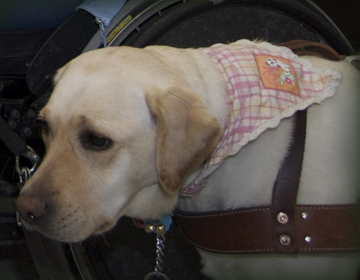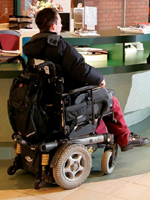

Support for People with Disabilities People with disabilities may require assistance in the form of service animals, support persons, assistive devices. |
|
 |
Service Animals are allowed to go wherever people with disabilities go including restaurants, elevators, and offices. The person with a disability has supervision of the animal at all times. Service animals assist people with a variety of disabilities. For example, dogs can help guide people with vision loss, or alert people who are deaf or hard of hearing to alarms, open automatic doors for people with the physical disabilities, and warn people with neurological conditions of impending seizures.
|
 |
Support Persons may accompany people with disabilities to assist with communications, mobility, personal care, or medical needs. Support Persons should be allowed to accompany a person with a disability anywhere they go. Always speak directly to the person with a disability and not the support person. When discussing confidential matters, confirm with the person whether they want the support person to be present. If admission is being charged to an event, organizers are not required to give support persons free or reduced admission. Notice of fees should be posted.
|
 |
Personal Assistive Devices are part of the personal space of the people using them. It is inappropriate to lean on, reach over, or restrict the movement of an assistive device. It is the college's responsibility to develop appropriate policies, practices and procedures regarding assistive devices. Front-line service staff must be trained to operate any personal assistive devices provided by the college before using them with people with disabilities. Personal assistive devices include the following:
|
| CC On | CC Off | Resources | Map | Back | Next | Audio Player: |
People with disabilities may require assistance in the form of service animals, support persons, assistive devices.
Service Animals are allowed to go wherever people with disabilities go including restaurants, elevators, and offices. The person with a disability has supervision of the animal at all times.
Service animals assist people with a variety of disabilities. For example, dogs can help guide people with vision loss, or alert people who are deaf or hard of hearing to alarms, open automatic doors for people with the physical disabilities, and warn people with neurological conditions of impending seizures.
Support Persons may accompany people with disabilities to assist with communications, mobility, personal care, or medical needs. Support Persons should be allowed to accompany a person with a disability anywhere they go. Always speak directly to the person with a disability and not the support person.
When discussing confidential matters, confirm with the person whether they want the support person to be present.
If admission is being charged to an event, organizers are not required to give support persons free or reduced admission. Notice of fees should be posted.
Personal Assistive Devices are part of the personal space of the people using them. It is inappropriate to lean on, reach over, or restrict the movement of an assistive device. It is the college's responsibility to develop appropriate policies, practices and procedures regarding assistive devices.
Front-line service staff must be trained to operate any personal assistive devices provided by the college before using them with people with disabilities.
Personal assistive devices include the following: